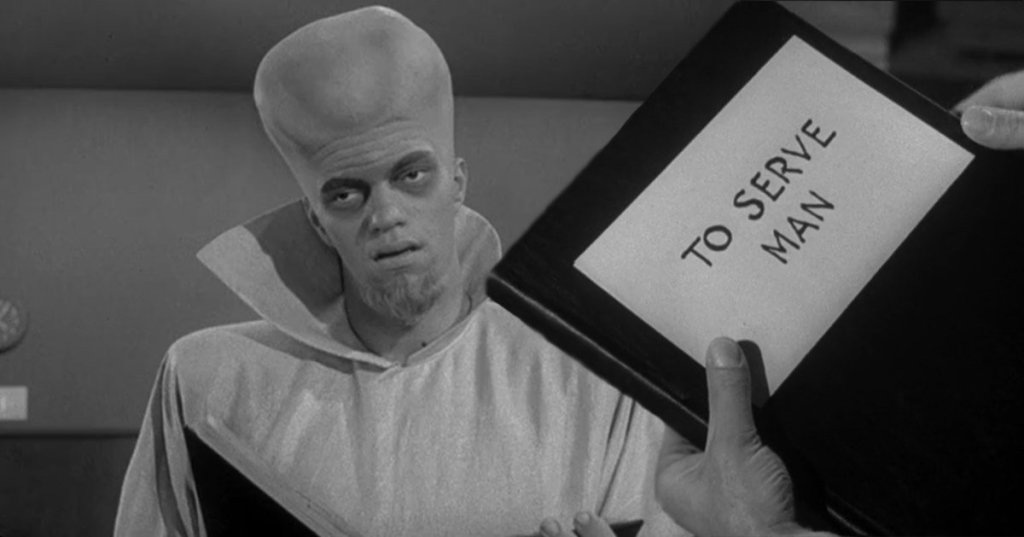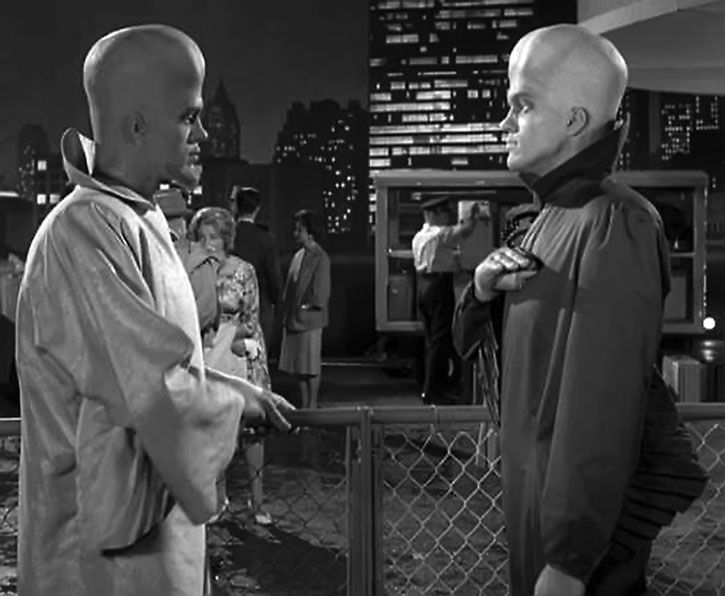There’s something unsettling about a seemingly benevolent alien race arriving on Earth with promises of a better future. What if, beneath the surface of their altruism, lurked a hidden agenda? This is the chilling premise behind “To Serve Man,” a classic episode of The Twilight Zone, that continues to resonate with audiences decades later.

Image: www.denofgeek.com
I vividly remember watching “To Serve Man” as a child. It was the first time I truly understood the power of storytelling to explore complex themes, like the dangers of blindly trusting authority figures even when they come bearing gifts, and the importance of questioning everything. The episode stayed with me, leaving me with a lingering sense of unease that I couldn’t shake. It’s this same sense of unease that keeps “To Serve Man” relevant today, as we navigate an increasingly complex and interconnected world and face constant challenges that require critical thinking and a healthy dose of skepticism.
The Curious Case of the Kanamit
The episode revolves around the arrival of the Kanamit, a race of tall, humanoid aliens with an unnaturally smooth white skin, who claim to have come in peace to “serve man.” They begin by sharing advanced technology and scientific advancements with humanity, seemingly with the intention of making Earth a better place.
The Kanamit’s sudden arrival triggers a wave of fascination and optimism in the world. Governments are eager to collaborate, scientists are ecstatic about the new knowledge, and the public is captivated by the promise of a brighter future. But amidst the euphoria, a lone voice of dissent emerges in the form of a skeptical translator, who notices something peculiar about the Kanamit’s language.
The Translator’s Discovery
“To Serve Man” is not just a sci-fi thriller; it’s a poignant commentary on the power of language and its potential for manipulation. The script revolves around the painstaking process of deciphering the Kanamit’s language, a task that proves to be much more challenging than initially anticipated. The translator uncovers the unsettling truth: the book titled “To Serve Man,” which the Kanamit presented as a guide to better living, is actually a cookbook – a cookbook for humans.
The episode’s climax is both shocking and unsettling. As the Kanamit gather humans for their ritualistic meal, the truth is revealed: “To Serve Man” is not a guide to a better future; it’s a guide to preparing humans for consumption! The episode ends with a heartbreaking image of humanity’s ignorance, a stark reminder of the risks of uncritical acceptance.
“To Serve Man” Beyond the Twilight Zone
The episode’s message transcends the realm of science fiction. It speaks to the dangers of blind faith, the importance of critical thinking, and the need to question authority figures even when they seem benevolent. In a world where information is constantly bombarding us from all sides, it’s more important than ever to cultivate a healthy skepticism and to be aware of the many ways in which language can be used to manipulate and deceive.
In the age of misinformation and propaganda, “To Serve Man” serves as a stark reminder of the need to engage critically with the world around us. It encourages us to question narratives, to be wary of claims that seem too good to be true, and to always look for evidence before forming an opinion. This episode is a powerful reminder that even the most seemingly altruistic motives can be masked by ulterior intentions, and that trusting blindly can have devastating consequences.

Image: www.posterposse.com
Tips for Avoiding “To Serve Man” Scenario in Real Life
While the scenario in “To Serve Man” is fictional, the message of being skeptical and seeking evidence resonates with real-life challenges. It’s tempting to fall into the trap of blindly trusting authority figures or accepting information without question, but it’s important to resist that urge. We must engage with the world around us with a critical eye, and always be willing to seek out alternative perspectives.
Here are some tips for avoiding “To Serve Man” scenarios:
- Question everything: Don’t blindly accept what you hear or read. Ask questions, look for evidence, and be willing to challenge your own assumptions.
- Be wary of claims that seem too good to be true: If something sounds too good to be true, it probably is. Be especially suspicious of claims that involve promises of quick and easy solutions, especially if those claims seem to come from sources with questionable motives.
- Seek out multiple perspectives: Don’t rely on just one source for information. Explore different perspectives, and be willing to consider ideas that challenge your own beliefs.
- Be mindful of the language used by authority figures: Notice how authority figures use language to persuade you. Be aware of the potential for manipulation, and don’t be afraid to call out those who engage in it.
- Develop your critical thinking skills: Critical thinking is essential for navigating a complex and ever-changing world. Practice analyzing information, identifying biases, and evaluating evidence.
FAQs About “To Serve Man”
Q: What is the symbolism behind the Kanamit?
The Kanamit represent a common trope in science fiction: the deceptive alien race with hidden motives. They embody the fear of the unknown and the potential dangers of unchecked technological advancement.
Q: How does “To Serve Man” reflect the Cold War era?
The episode was written and broadcast during the Cold War, a period of heightened geopolitical tension and fear of nuclear war. The episode’s themes of distrust, manipulative propaganda surrounding advanced technology, all resonate with real-world anxieties of the time.
Q: Why is “To Serve Man” still relevant today?
The episode’s themes of skepticism, critical thinking, and the dangers of blindly trusting authority figures are as relevant today as they were in the 1960s. In a world flooded with information, it’s more important than ever to be a discerning consumer of information and to approach new ideas with a healthy dose of skepticism.
Watch The Twilight Zone To Serve Man
Conclusion
In a world that’s constantly evolving and changing, “To Serve Man” serves as a timeless reminder of the importance of critical thinking, skepticism, and the need to question authority figures. It encourages us to be vigilant and aware of the potential for manipulation, even when it comes from seemingly benevolent sources.
Are you interested in exploring the deeper themes and messages behind “To Serve Man”? What are your thoughts on this classic Twilight Zone episode? Share your insights in the comments below!






